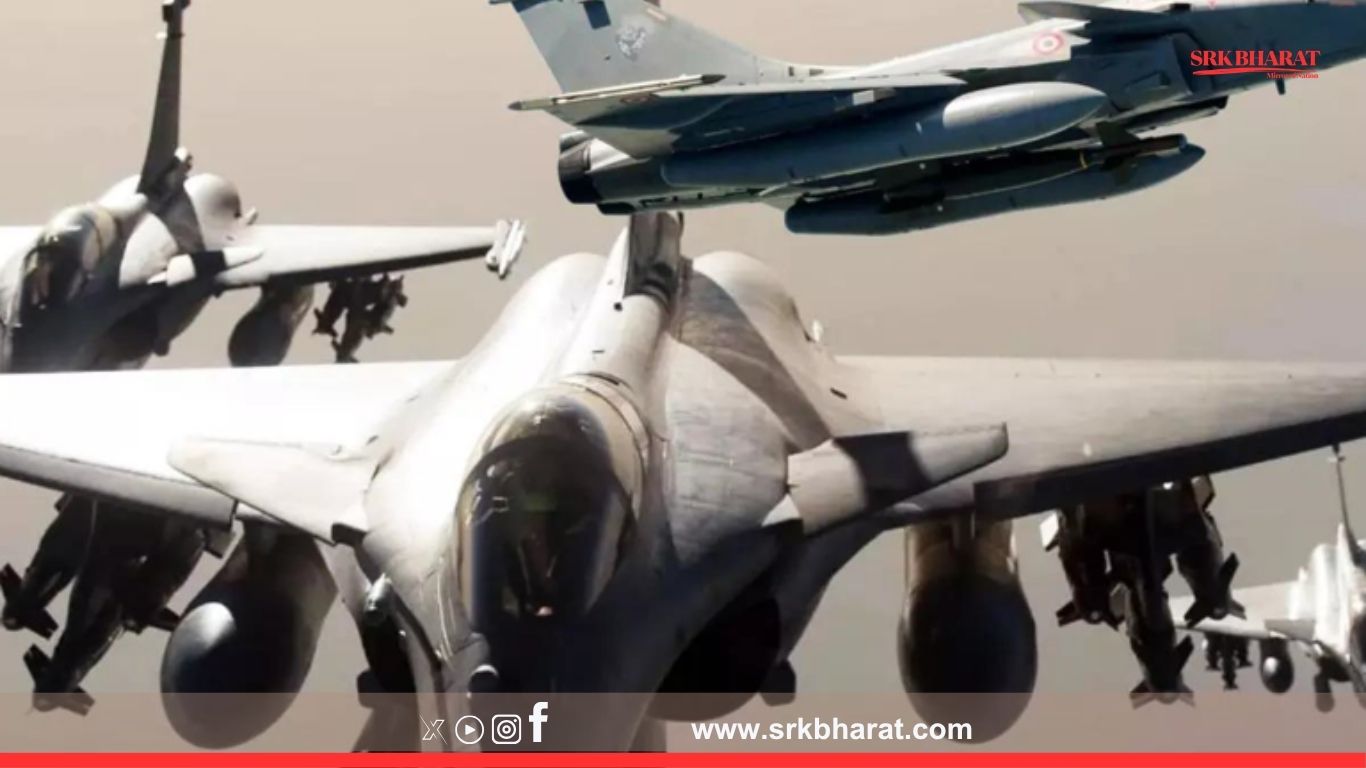Dassault Aviation, the French aerospace giant manufacturing Rafale fighter jets, has strongly denied media reports suggesting that it confirmed the loss of an Indian Rafale jet during the Indian Air Force’s (IAF) recent “Operation Sindoor” exercises. In a sharply worded statement, Dassault clarified that no such incident occurred and dismissed fabricated quotes attributed to its CEO as “completely baseless.”
Context: Operation Sindoor Exercises
Operation Sindoor was a high-intensity combat readiness and joint forces exercise conducted by the IAF across northern and eastern sectors in June-July 2025. The exercise involved:
- Deployment of Rafale fighter jets alongside Su-30MKIs and indigenous Tejas.
- Simulated deep-strike, precision targeting, and electronic warfare missions.
- Coordination with Army and Navy units for integrated theatre command objectives.
The Rumoured Rafale Loss And Dassault’s Response
Certain unverified social media posts and speculative defence blogs claimed that a Rafale aircraft was “lost” during the exercise due to operational mishap. Further, they published statements purportedly from Eric Trappier, CEO of Dassault Aviation, expressing “regret” over the incident.
Dassault Aviation categorically denied these reports stating:
“No Rafale aircraft operated by the Indian Air Force has been lost during any recent exercises. Statements attributed to our CEO are fabricated and false. Dassault Aviation has not issued any such comment. We reaffirm our full commitment to supporting the IAF’s operational readiness with the Rafale fleet performing excellently.”
Indian Air Force Also Denies The Reports
The IAF’s official spokesperson echoed Dassault’s clarification:
“All Rafale aircraft are fully operational and no incident as reported has taken place. Such misleading information creates unnecessary confusion and undermines national security interests.”
Why Did These Reports Emerge?
Defence analysts noted that:
- Misinterpretation Of Routine Maintenance Movements: Some posts mistook grounded aircraft during maintenance checks as an accident loss.
- Lack Of Official Verification: Viral speculative tweets without source validation spread rapidly.
- Strategic Disinformation Risks: Experts warned that misinformation around defence assets could be linked to adversarial psychological operations aiming to undermine public confidence.
The Rafale Jet’s Strategic Importance For India
| Feature | Specification |
|---|---|
| Origin | Dassault Aviation, France |
| Induction | 36 jets ordered in 2016; final deliveries completed in early 2023 |
| Capabilities | Omni-role fighter with advanced AESA radar, Meteor beyond visual range missiles, SCALP cruise missiles |
| Range | Combat radius over 1,800 km with in-flight refuelling |
| Current Deployment | Ambala Air Force Station (Haryana) and Hashimara Air Force Station (West Bengal) for western and eastern theatre operations |
The Rafale has significantly enhanced India’s air dominance and precision strike capabilities, particularly against China in the eastern sector and Pakistan on the western front.
Recent Rafale Operational Highlights
| Month | Operation | Outcome |
|---|---|---|
| June-July 2025 | Operation Sindoor | Successful validation of deep-strike and integrated combat drills |
| March 2025 | Eastern theatre readiness drills | Rafale jets conducted simulated Brahmaputra valley interdiction missions |
| December 2024 | Gagan Shakti II | Demonstrated mid-air refuelling with IL-78 and Su-30MKI joint exercises |
Dassault Aviation’s Global Reputation
Dassault Aviation is one of the world’s leading fighter jet manufacturers with a strong operational record across:
- French Air Force Rafale operations
- Egyptian Air Force frontline deployment
- Qatar, Greece, and Indonesia acquisitions
No recent operational accident involving Rafale jets has been reported in India or internationally in 2024-25.
Industry Expert Opinions
| Expert | Organisation | Comment |
|---|---|---|
| Air Marshal (Retd) Raghunath Nambiar | Former IAF Western Air Command Chief | “Rafale’s induction has been transformational. Misinformation undermines public confidence and strategic messaging.” |
| Angad Singh | Defence Aviation Analyst | “Fake quotes attributed to CEOs should be cross-verified. Defence reporting demands utmost responsibility.” |
| Manu Pubby | Senior Defence Journalist | “Dassault’s swift clarification indicates seriousness about brand reputation and client trust.” |
Social Media Reactions
- “No Rafale crash confirmed by IAF or Dassault. Fake news machinery at work again.”
- “Such misinformation affects troop morale. Glad Dassault called it out promptly.”
- “Rafale performing excellently in Operation Sindoor. India’s air power remains formidable.”
Operation Sindoor: Key Takeaways
- Integrated Theatre Training: Enhanced coordination among IAF, Army, and Navy under proposed integrated theatre commands.
- Night-Time Deep Strikes: Rafale jets tested low-level ingress for high-value target neutralisation.
- Electronic Warfare Dominance: Rafale’s SPECTRA EW suite successfully jammed simulated enemy radars and communication networks.
Dassault’s Ongoing Commitments In India
- Maintenance & Spares Support: Through Dassault Reliance Aerospace Limited (DRAL) JV in Nagpur.
- Upgrades: Software and system upgrades aligned with French Air Force enhancements.
- Future Procurement Prospects: Rafale-M (naval variant) is competing for Indian Navy’s deck-based fighter requirement for INS Vikrant and future carriers.
Conclusion
The denial by Dassault Aviation and the Indian Air Force regarding reports of a Rafale loss during Operation Sindoor underscores the importance of fact-based defence reporting and responsible social media sharing in national security matters. As India continues to strengthen its air power with advanced platforms like the Rafale, ensuring information integrity becomes equally critical to preserving strategic credibility and operational confidence.
Disclaimer
This news article is prepared for general national security and defence news dissemination based on official statements, verified operational updates, and expert analyses. Readers are advised to consult Ministry of Defence releases, Indian Air Force communiqués, and certified defence analysts for precise and authoritative insights before deriving conclusions or framing policy, investment, or strategic opinions regarding India’s defence assets and aerospace procurement programmes.











